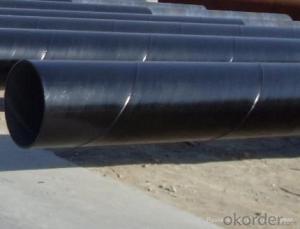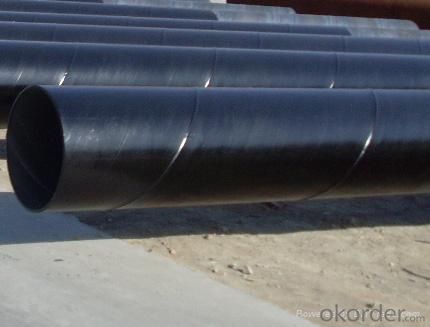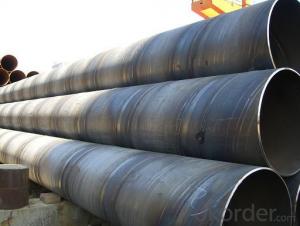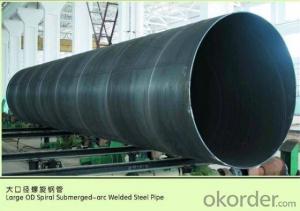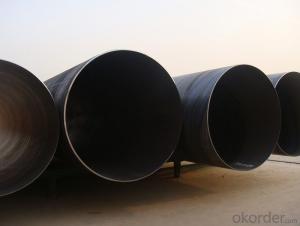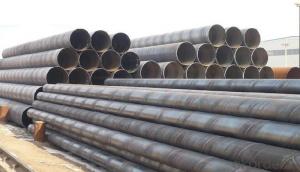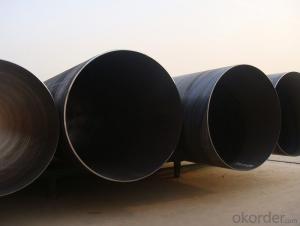SPIRAL STEEL PIPE 42’‘46’‘48‘‘50’‘ LARGE DIAMETER PIPE
- Loading Port:
- Tianjin
- Payment Terms:
- TT OR LC
- Min Order Qty:
- 5 m.t.
- Supply Capability:
- 3000 m.t./month
OKorder Service Pledge
OKorder Financial Service
You Might Also Like
Packaging & Delivery
Packaging Detail: | standard export packing or as customer's requirement |
Delivery Detail: | within 10 - 30 days |
Specifications
Spiral Welded Steel Pipes and Tubes
1.Material:Q195-Q235
2.Length:1-12m
3.WT:1.0-14mm
4.O.D.:20-273mm
Spiral Welded Steel Pipes and Tubes
Product Description:
1.Material : Q235,Q345,L245,L290,L360,L415,L450,L485,GrB,X42,46,X52,X56,X60,X65,X70,X80,X100
2,Standard: SY/T5037-2000,GB/T9711-2011,API Spec 5L PSL1/PSL2,ASTM A252\A53,ISO3183,DIN17172,EN10217,JIS G3457,AWWA C200,ASTM A139,ASTM A671,ASTM A672
3.Wall thickness: 3.0mm-30mm
4.Outer diameter: φ168mm-3020mm
5,Length: 5m-12m or as your requirement
6,Corrosion protection standard: DIN30670,DIN30671, AWWAC210, AWWA C203, SY/T0413-2002,SY/T0414-2002
7,Application: Oil, gas, natural gas, water pipe, thermal electricity pipe, steel structure engineering, etc
Q195-q345 Material Steel Pipe's Materials
Elements | Chemical Compsition% | Mechanical Property | ||||||
C% | Mn% | S% | P% | Si% | Yield Point (Mpa) | Tensile Strength(Mpa) | Elongation | |
Q195 | 0.06-0.12 | 0.25-0.50 | <0.050< span=""> | <0.045< span=""> | <0.030< span=""> | >195 | 315-430 | 32-33 |
Q215 | 0.09-0.15 | 0.25-0.55 | <0.05< span=""> | <0.045< span=""> | <0.030< span=""> | >215 | 335-450 | 26-31 |
Q235 | 0.12-0.20 | 0.30-0.70 | <0.045< span=""> | <0.045< span=""> | <0.030< span=""> | >235 | 375-500 | 24-26 |
Q345 | <0.20< span=""> | 1.0-1.6 | <0.040< span=""> | <0.040< span=""> | <0.55< span=""> | >345 | 470-630 | 21-22 |
- Q: How are steel pipes threaded for connection?
- Steel pipes are threaded for connection using a process called threading, which involves cutting helical grooves into the pipe's surface. This is typically done using a machine called a pipe threading machine, which rotates the pipe while a cutting tool is held against it, creating the desired threading pattern. The threaded ends of the pipes can then be connected using fittings or couplings to create a secure and leak-proof joint.
- Q: What is the difference between steel pipes and PVC-U pipes?
- Steel pipes and PVC-U pipes differ in terms of their composition, strength, and suitability for different applications. Steel pipes are made from iron and carbon, making them strong and durable, capable of withstanding high pressure and extreme temperatures. They are commonly used for transporting liquids and gases in industries like oil, gas, and construction. On the other hand, PVC-U pipes are made from polyvinyl chloride, a plastic material. They are lightweight, easy to install, and resistant to corrosion and chemicals. PVC-U pipes are typically used for water supply, drainage systems, and irrigation.
- Q: What is the difference between steel pipes and PVC pipes?
- Steel pipes and PVC pipes differ in material composition and their respective properties. Steel pipes are made from a combination of iron and carbon, providing them with high strength and durability. They are suitable for carrying pressurized fluids and can withstand extreme temperatures. On the other hand, PVC pipes are made from a synthetic plastic material called polyvinyl chloride. They are lightweight, easy to install, and resistant to corrosion and chemicals. PVC pipes are commonly used for drainage systems, irrigation, and household plumbing.
- Q: How are steel pipes measured and labeled?
- Steel pipes are typically measured and labeled based on their diameter, wall thickness, and length. The diameter is measured in inches or millimeters, while the wall thickness is often expressed in inches or schedule numbers. The length is usually specified in feet or meters. Additionally, steel pipes may also bear labels indicating the type of steel used, industry standards compliance, and any specific certifications or markings required.
- Q: What are the advantages of using steel pipes in the manufacturing industry?
- There are several advantages of using steel pipes in the manufacturing industry. Firstly, steel pipes are known for their strength and durability, making them suitable for handling heavy loads and withstanding high pressures. Secondly, steel pipes have excellent corrosion resistance, which ensures a longer lifespan and reduces the need for frequent replacements. Additionally, steel pipes offer a smooth interior surface, allowing for efficient fluid flow and minimizing friction losses. They are also highly versatile, as they can be easily fabricated and customized to meet specific requirements. Finally, steel pipes are environmentally friendly, as they are recyclable and contribute to sustainable manufacturing practices.
- Q: How do steel pipes compare to other pipe materials like PVC or copper?
- Steel pipes have several advantages over other pipe materials like PVC or copper. Firstly, steel pipes are incredibly strong and durable, making them suitable for high-pressure applications and long-term use. They have a higher resistance to cracking or breaking, which is especially beneficial in demanding environments. Secondly, steel pipes have excellent heat resistance, making them ideal for transporting hot fluids. On the other hand, PVC pipes are more lightweight, cost-effective, and easy to install, making them suitable for non-pressure applications. Copper pipes are known for their corrosion resistance and ability to handle high temperatures, but they are typically more expensive. Overall, the choice between steel, PVC, or copper pipes depends on the specific requirements of the application, considering factors like pressure, temperature, cost, and ease of installation.
- Q: DN150 welded steel tubes one meter multiple
- The theoretical weight table of welded steel pipe (Kg) can be checked, and the outer diameter and wall thickness can be measured according to the formula.For example: DN150 welded steel pipe, diameter 165mm, thickness 4.5mm, weight kg per meter.Welded steel pipe theoretical weight (Kg/m) = (165-4.5) * 4.5 * 0.02466=17.81Kg
- Q: Can steel pipes be used for water treatment plants?
- Yes, steel pipes can be used for water treatment plants. Steel pipes are widely used in water treatment plants due to their high durability, strength, and resistance to corrosion. They can effectively handle the high pressure and flow requirements of water treatment processes. Additionally, steel pipes can be easily welded and joined, making them suitable for various applications within water treatment plants, such as transporting raw water, treating chemicals, and distributing treated water.
- Q: How are steel pipes classified based on their wall thickness?
- Steel pipes are classified based on their wall thickness into three categories: standard weight, extra-strong, and double extra-strong.
- Q: Can steel pipes be used for agricultural irrigation?
- Yes, steel pipes can be used for agricultural irrigation. They are a durable and long-lasting option that can withstand high pressures and extreme weather conditions. Steel pipes also provide excellent protection against corrosion and damage, making them suitable for various irrigation systems in agriculture.
Send your message to us
SPIRAL STEEL PIPE 42’‘46’‘48‘‘50’‘ LARGE DIAMETER PIPE
- Loading Port:
- Tianjin
- Payment Terms:
- TT OR LC
- Min Order Qty:
- 5 m.t.
- Supply Capability:
- 3000 m.t./month
OKorder Service Pledge
OKorder Financial Service
Similar products
Hot products
Hot Searches
Related keywords
